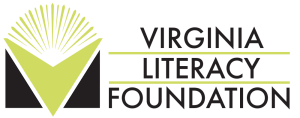Starting an Adult Literacy Program
On this page find the links and resources you will need to start a nonprofit adult literacy program in Virginia, whether it is library-based, community based, faith-based, or a GED program. Regardless of the type of literacy program you want to start, your first steps will be to recruit a dedicated team of volunteers, form a board of directors, and begin the process of obtaining a 501(c)3 status or find a fiscal partner (organization) that has successfully achieved this status.

Types of Literacy Programs
Depending on what program you would like to offer, these categories will explain in depth the following programs. The first two headings are links that will lead to more information on the topic.
- Community-based Literacy Program: Also known as a CBLO, this program generally targets adults who read at the very lowest levels of literacy. Some community-based organizations offer many services (basic literacy, GED, ESOL, health literacy, etc.) and some simply target one kind of service, such as tutoring native English-speaking adults. The information in this link will help you set up a general adult literacy program for basic literacy learners.
- ESOL Program: English for Speakers of Other Languages programs (ESOL) teach adults for whom English is a second language. Specialized knowledge and skills are needed to set up this type of program, including immigration issues and civics education.
- Library-based Literacy Program: An adult literacy program housed in a local library adheres to library hours, policies, and administration. Click here to view the page for LV of Campbell County in Virginia.
- Faith-based literacy programs are run by church volunteers and overseen by the church authority.
Organizations
These organizations are geared to helping adult education program and staff in all facets of program management, from fund development, to grand writing, to training. Find the organizations in the sidebar on the right.
- ProLiteracy: National Adult Literacy Organization
- Society for Nonprofit Organizations: advice on how to start a nonprofit organization
- Management Library for Nonprofits: excellent library for nonprofit management
Publications
The links provided in this section will help you to understand the key roles of volunteers, how to recruit them, and how to design the best adult literacy program in your community.
Important Links
These links lead to information that is important for all adult literacy groups. Find these links in the sidebar on the right.
- Starting a Nonprofit: What You Need to Know: Manual from the University of Richmond
- Facts and Statistics for Adult Education and Literacy in Virginia and the U.S.: Information for grant writers and outreach specialists
Need more help? Training and Professional Development
In this section find online resources, such as the Online Tutor Training, a self-guided workshop for volunteer tutors designed for adult literacy programs that do not yet have a training team or that are in transition. It is recommended that program staff take the online course before assigning it to volunteer tutors. The Virginia Literacy Foundation also provides many resources on its website. Onsite and online training is available to VA-DOE or VLF-funded programs at the Virginia Adult Learning Resource Center (www.valrc.org).
- Online ESOL Training – a compilation of training resources for ESOL teachers and students
- Online Tutor Training Workshop – an asynchronous 14 hr. tutor training workshop for adult literacy tutors and trainers.
- Virginia Adult Learning Resource Center – find resources and trainings on this extensive professional development site. VALRC is a vital partner of the VLF.
